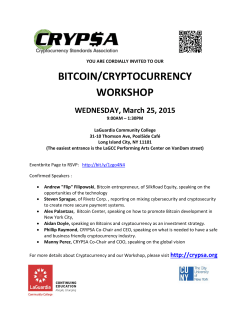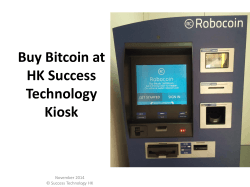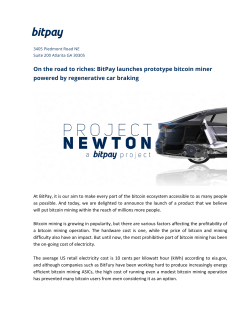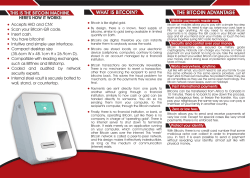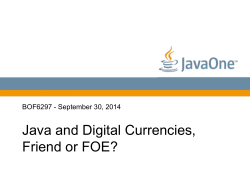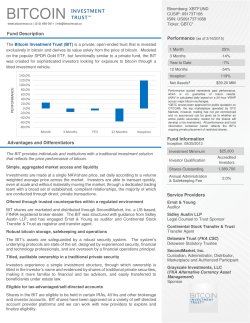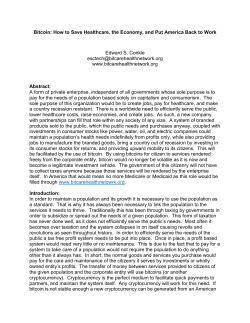
Bitcoin: how to regulate a virtual currency
8/22/13 Bitcoin: how to regulate a virtual currency | IFLR.com Bitcoin: how to regulate a virtual currency Author: Gemma Varriale | Published: 20 Aug 2013 Bitcoin has surged in popularity this year, benefitting from concern about the safety of bank deposits following the bail-in of Cypriot depositors; But, with New York’s top banking watchdog last week issuing subpoenas to 22 Bitcoin companies, the regulatory net seems to be closing in around the controversial crypto-currency; One decision supervisors now face is whether to ban Bitcoin, and risk driving the currency underground, or to try to regulate its flow. According to one source close to the matter, the latter is impossible; In future, Bitcoin regulation will likely arise at the gateways, or the points at which people take real currency and transform it into virtual currency; The use of Bitcoin to facilitate micro-transactions among the unbanked presents one of the major untapped possibilities of the emerging currency. Bitcoin has surged in popularity this year, benefitting from concern about the safety of bank deposits following the bail-in of Cypriot depositors. But, with last week’s announcement that New York’s top banking watchdog has subpoenaed 22 Bitcoin companies, the regulatory net seems to be closing in around the controversial crypto-currency. Invented in 2008, Bitcoin is a decentralised digital payments system that is not issued by a central bank. The virtual currency is created through a competitive process known as mining, in which a computer solves a cryptographic problem. It operates behind a veil of anonymity - a fact that has piqued US regulators’ attention, and led to mounting concern about its potential to be used for illegal activities. “Bitcoin is either feared because of ignorance or distrusted because of its history,” said Joe Cutler, Seattle-based counsel with Perkins Coie. “But there’s nothing inherently dangerous about Bitcoin. In fact, I think it’s a superior medium of exchange than many of the traditional methods of payment we now rely on out of necessity.” “Bitcoin appears to be poised to make a quantum leap from transactions that are largely between maths nerds and underground online participants to the mainstream,” Cutler added. Virtual currency, real problem...? The Bitcoin companies subpoenaed reportedly have to provide information on anti-money laundering controls, consumer protection measures, and investment strategies in virtual currencies. Benjamin Lawsky, who heads the New York Department of Financial Services (DFS), has said that the Department is considering new regulatory guardrails specifically for emerging virtual currencies. Meanwhile, a federal judge in Texas had already declared that Bitcoin is an investment contract for www.iflr.com/Article/3245397/Banking/Bitcoin-how-to-regulate-a-virtual-currency.html 1/3 8/22/13 Bitcoin: how to regulate a virtual currency | IFLR.com securities and should therefore be regulated like any other official currency. The net, it seems, is closing in on the once obscure crypto-currency. Related content In Bitcoin, we trust? Banking sector reform: a definitive guide to the latest developments Among the regulatory options available, US banking supervisors could seek to apply money transmission regulations, or the US Securities and Exchange Commission (SEC) might favour regulations based on the treatment of Bitcoin as securities. Equally, laws on fraud, money laundering and commerce in narcotics could be brought to bear if Bitcoin is used for illegal purposes. A fundamental decision supervisors now face is whether to ban Bitcoin outright - and risk driving the currency underground - or whether to try to regulate transactions at critical points, such as where it is transformed into fiat currency. According to Cutler, banning Bitcoin is impossible. "Bitcoin is a simple decentralised ledger and I don't think a single jurisdiction has the power to control the blockchain where all these transactions are recorded," he said. Because Bitcoins aren’t stored in any central location, Cutler said the idea of regulators seizing funds doesn't make as much sense as it might in a centralised system, or in a system where money retains some form of physicality or location. In light of that, he expected that future regulation would likely focus on the gateways, or the points at which people take real currency and transform it into virtual currency. But, although it is certainly much more difficult for an anonymous peer-to-peer currency like Bitcoin to be regulated, it might not be impossible. Stanford University finance professor, Darrell Duffie, said that if Bitcoin became a significant business activity, the justice system or regulators could begin to investigate Bitcoin users directly and subpoena their use of the currency. One way of doing this would be to ask users for their business records showing how they use Bitcoin. But to what extent would regulation of Bitcoin transactions undermine the utopian currency’s original purpose? The world of Bitcoiners is divided on this question. “The early adopters think it will lose all its flavour as soon as it gets regulated,” said Cutler. “But there’s a whole host of other entities that have embraced the fact that it’s going to be regulated and are working hard to devise ways to ensure it remains relevant.” “An untapped market” One of the key benefits of the payment system is that, by doing away with layers of fees and www.iflr.com/Article/3245397/Banking/Bitcoin-how-to-regulate-a-virtual-currency.html 2/3 8/22/13 Bitcoin: how to regulate a virtual currency | IFLR.com bureaucracy, Bitcoin transactions can be settled more quickly than those involving traditional currencies. "That leaves the only residual complaint that Bitcoin is supposedly anonymous, which is what regulators seem to fear," said Cutler. "In fact, it's not as anonymous as people think it is; it's certainly not as anonymous as cash and we've allowed cash to travel around the world for centuries." Indeed, recent developments have seen Paypal and Amazon look at ways to enter the market and integrate with Bitcoin. Perhaps more importantly, some virtual currency networks purport to deal in regular currency as well as virtual currency, using virtual currency as the mediator between the two. “This could eliminate the need for foreign exchange and revolutionise the way international business is conducted,” said Cutler. “The mainstream use of Bitcoin is the next frontier and it’s not that far away.” One untapped market could lie outside the first and second world rubric that has been the focus of media attention to date. “The use of Bitcoin to facilitate micro-transactions among the unbanked is to me the major untapped possibility,” Cutler told IFLR. He pointed to the development of a technology that allows simple text commands to move Bitcoin between people. This could enable those in Africa with access to mobile phones to replace their barter system with a more stable means of exchange, avoiding the corrupt banks, bribery and fluctuating currencies of their own countries. “We forget sometimes in the cosiness of our cars and air-conditioning that there are millions of people who would benefit from that, and from whom even tiny transaction fees could make an entrepeneurial business a lot of money,” said Cutler. Whether or not Bitcoin survives its current troubles, Dr Eli Ben-Sasson, professor of theoretical computer science at Technion, Israel Institute of Technology, believed that this latest evolution of currency, with financial trust based on distributed computation and cryptography, is here to stay. See also: In Bitcoin, we trust? Banking sector reform: a definitive guide to the latest developments The material on this site is for financial institutions, professional investors and their professional advisers. It is for information only. Please read our terms and conditions and privacy policy before using the site. All material subject to strictly enforced copyright laws. © 2013 Euromoney Institutional Investor PLC. For help please see our FAQ. www.iflr.com/Article/3245397/Banking/Bitcoin-how-to-regulate-a-virtual-currency.html 3/3
© Copyright 2025
